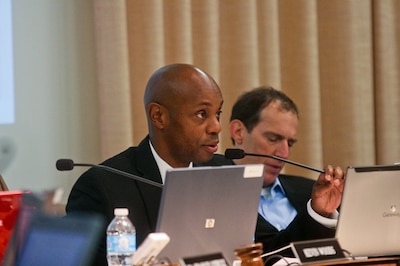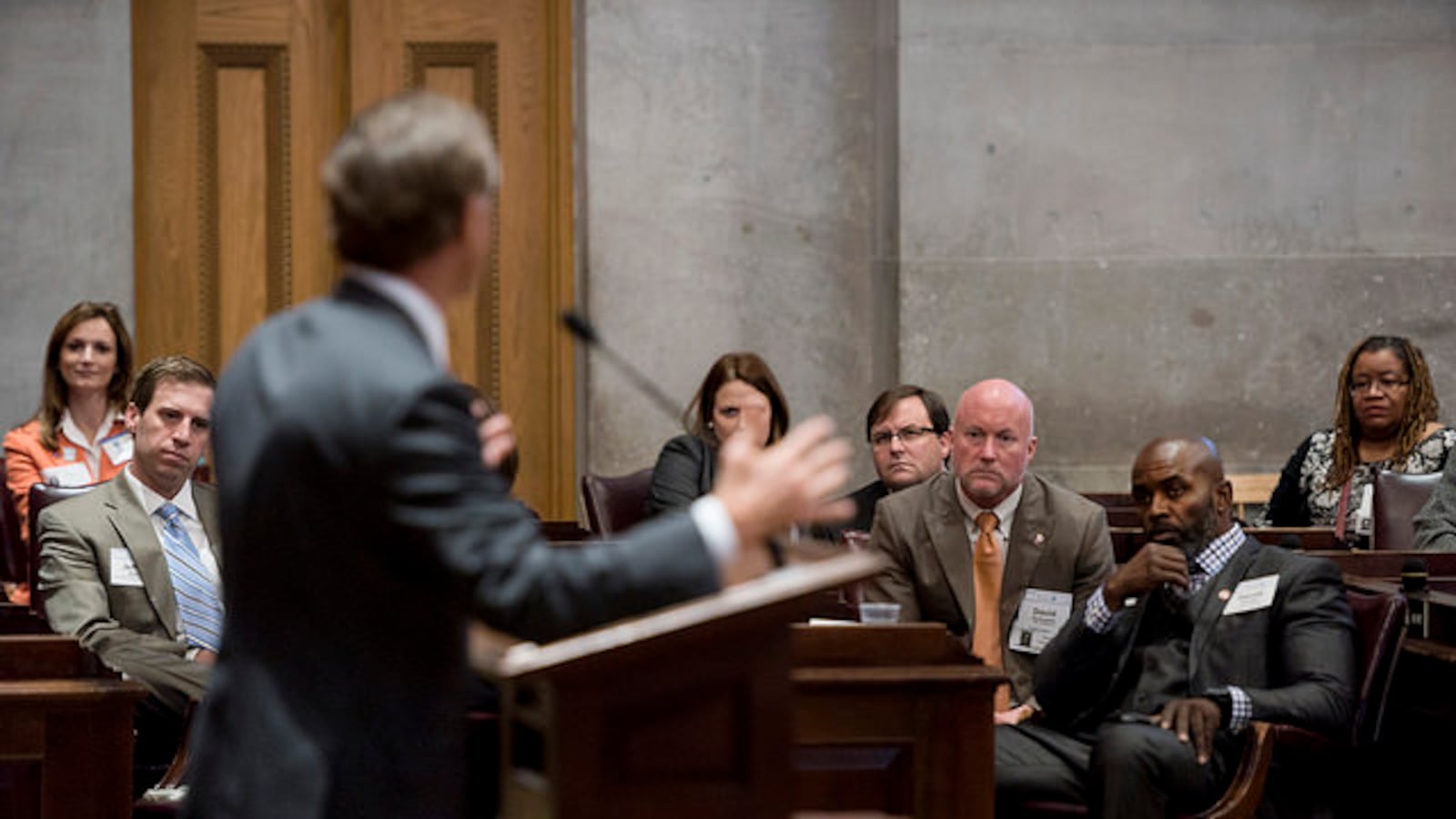Charging that the state has breached its constitutional duty to provide “a system of free public education” for children in Tennessee, the Hamilton County Board of Education and six smaller school districts sued state officials on Tuesday, asking that the court order the General Assembly to address a broken system that has resulted in hundreds of millions of dollars of underfunding.
The suit asserts that, instead, the state has created a system that “shifts the cost of education to local boards of education, schools, teachers and students, resulting in substantially unequal educational opportunities across the State.”
Specifically, the suit claims the state’s funding formula underestimates the cost of teachers’ salaries by about $532 million and that schools face an annual shortfall of about $134 million in classroom costs.
The suit was filed in Davidson County Chancery Court by school boards in Hamilton, Bradley, McMinn, Marion, Grundy, Coffee and Polk counties. It names Gov. Bill Haslam, Education Commissioner Candice McQueen, Lt. Gov. Ron Ramsey, House Speaker Beth Harwell, and members of the State Board of Education.
The lawsuit was the first legal volley fired by local school officials weary of chronic underfunding by the state. The action came one day after superintendents from Tennessee’s four largest school districts, including Hamilton County, met with Haslam in Nashville to discuss school funding issues.
Haslam spokesman David Smith said the governor was “very disappointed” about the lawsuit after committing Monday to collaborating with superintendents to address the challenge. “Litigation will obviously decrease potential for collaboration,” Smith said in a statement.
Hamilton County Superintendent Rick Smith said his district intends to continue working with the governor and legislative leaders. “The board does not believe that its decision to assert its legal claims should preclude productive dialogue since everyone, ultimately, wants the very best education for everyone in our state,” he said in a statement.
Local district leaders across Tennessee have intensified discussions about inadequate state funding since 2013 when representatives of Metro Nashville Public Schools discovered fundamental questions about the state’s Basic Education Program (BEP), the state’s school funding formula.
The school boards of Shelby, Knox, Hamilton and Bradley counties voted earlier this year to explore possible legal action, while school leaders in Nashville chose negotiation over litigation.

Shelby County Schools Superintendent Dorsey Hopson, who represents the state’s largest public school district, wants a legal analysis conducted before determining whether his district should go to court.
“Being a lawyer, I want to understand the merits … and make sure it’s a winnable suit before you jump out there,” he told the district’s Board of Education Tuesday night.
Hopson, who was among superintendents who met with Haslam on Monday, complimented the governor for initiating discussions on the matter. “I can tell you he’s committed to increasing student achievement outcomes for students and expressly stated funding isn’t all of that but a lot of that,” Hopson said.
Board member Chris Caldwell, who has shepherded Shelby County’s exploration of possible legal action against the state, expressed frustration over the legislature’s unwillingness to adequately fund education for all Tennessee children. “I think the governor has tried to do a lot of good things,” he said. “My concern is his being able to get the General Assembly to go along with him.”
In January, Haslam unveiled his budget proposal to include an additional $170 million in state spending for K-12 education, including $44 million for the BEP.
However, that’s far below the funding outlined in Tuesday’s lawsuit. Specifically, it cited the legislature’s 2007 amending of the BEP to include the cost of teachers within the funding formula, with adjustments anticipated from time to time based on recommendations from a BEP review committee.
The lawsuit notes that the review panel’s most recent report, issued last November, found that the BEP formula failed to: estimate accurately a local district’s cost of insuring its teachers; use the actual salary costs incurred in employing teachers; provide the required 75 percent of classroom expenses set forth under Tennessee law; provide the cost of professional development and mentoring of teachers; fund school nurses and technology coordinators; provide adequate funding for teaching materials and supplies; and account for the increased use of technology within school systems.
“In total, the BEP Review Committee concluded that the General Assembly is underfunding education in Tennessee by hundreds of millions of dollars,” the suit says.
While commending the state for initiating higher academic standards and accountability measures, the suit says the state has not provided adequate funding for such education reforms, placing additional demands on local boards to pay for unfunded mandates.
Meanwhile, the suit notes, parents in more affluent communities are paying fees and participating in fundraising activities that defray local education costs while also contributing to an inequitable level of funding education across the state.
“The General Assembly has been aware of its obligation to fund a system of free public education across the State for more than 20 years and yet has been deliberately indifferent to its constitutional duty,” the suit says.
Contact Marta W. Aldrich at maldrich@chalkbeat.org
Follow us on Twitter: @chalkbeattn
Like us on Facebook
Sign up for our free newsletter for regular updates on Tennessee education news.

